May 2022 1st edition
May 2022 1st edition vuyelwan
English PDF version
Translations
Afrikaans
isiNdebele
isiXhosa
isiZulu
Sepedi
Sesotho
Setswana
Siswati
Tshivenda
Xitsonga
Business management training for entrepreneurs
Business management training for entrepreneurs vuyelwanSouth African citizens aged 18 to 35 who have a 100% youth-owned business, or would like to start one, can apply for the National Youth Development Agency’s (NYDA) grant or voucher programmes.
To receive funding from these programmes, entrepreneurs first have to complete one of the NYDA’s short, three- to six-day business management training courses, which include ‘Generate your Business Idea’, ‘Start your Business’ or ‘Improve your Business’.
The courses, accredited by the International Labour Organisation, focus on young entrepreneurs who are at promising and new stages of enterprise development, providing them with the skills, knowledge, values and attitudes needed to run a successful business.
The training is aimed at responding to young people’s market and business needs, providing skills that can assist them with business idea generation, start-up assistance, early development, growth and expansion. 
Kelebogile Sasa, who completed one of the courses, says it helped her to open and run her business, and taught her how to deal with clients and make sure her company’s books are always updated.
“It helped me to understand what business is. Receiving business training before receiving the grant is important because there’s no use running a business without a business background.
“If I didn’t receive the training, I don’t think I would be where I am right now because I didn’t know anything about business. Now I have all of the basic steps that I need to follow so that my business can be successful,” she adds.
In addition to business management training, young entrepreneurs whose business ideas qualify for the NYDA grant and voucher programmes, can also benefit from some of the agency’s non-financial support services, including mentorship, business consultancy services and market linkages.
For more information about the NYDA and its business management training, visit www.nyda.gov.za or your closest NYDA branch.
China donates R1 million towards KZN flood relief
China donates R1 million towards KZN flood relief LondekileSocial Development Minister, Lindiwe Zulu, recently received a donation of R1 million from the Ambassador of the People’s Republic of China to South Africa, Chen Xiaodong.
The donation is aimed at increasing the reach of government’s ongoing humanitarian relief efforts in the flood-stricken areas.
The donation follows the declaration of the National State of Disaster recently after various municipal areas of KwaZulu-Natal and the Eastern Cape were ravaged by extreme weather conditions.
Ambassador Chen said in the face of major natural disasters, such as the floods, China and South Africa have always stood together and supported each other. He added that donation showed China’s commitment to help South Africa through a difficult time.
Minister Zulu said the donation will support emergency humanitarian and recovery efforts in the affected areas.
“On behalf of the people and the government of the Republic of South Africa, we extend our deepest gratitude to the government of the People’s Republic of China for this generous donation. [It] will enable us to meet the immediate needs of hundreds of families affected by the recent floods, including people who are displaced from their homes, to get back on their feet,” she said.
Minister recently visited the flood-stricken Ndwedwe and Mandeni Local Municipalities under iLembe District Municipality to provide the much-needed relief to families affected by the disaster.
These two municipalities are among the worst hit by the disaster that left a trail of destruction, resulting in the loss of over 400 lives, including three members of the Mdletshe family in Ndwedwe.
During her visit, Zulu interacted with affected families, local community-based organisations, community leaders and social service professionals deployed to provide psychosocial support services in the area.
“Our thoughts and prayers are with those who have lost their loved ones and those who are uncertain about the fate of their loved ones. We have deployed psychosocial support teams where our services are needed most. We are also working with a number of partners to support humanitarian relief efforts,” she said. – SAnews.gov.za
Dream comes true for kickboxing champion
Dream comes true for kickboxing champion LondekileGregory Gans (26) is the reigning Ring Contact Fighting Arts International (RCFAI) Super Welterweight Low Kick World Champion.
Gans from Saldanha Bay was crowned champion after beating Karim Taquet from Belguim in a title fight in Cape Town recently.
RCFAI is a unique style of martial arts that is based on the principles of boxing, judo, wrestling, karate and ballet. 
Gans says winning the championship is a dream come true for him.
“I always had a fascination for martial arts. When I was a child I used to copy fighting moves that I would see on television. In 2009, the sport was introduced to our school in a form of a development program that was run by Josh Cloete who is now my main coach. I joined and started competing three months after."
Gans, who is also a kickboxing trainer, says this is his first major title win.
“This win was for the super welterweight 75.8kg. It was an open title fight so no one held the title before. Winning it felt amazing. My previous wins were all in the amateur division.
"I've won the South American Championships six times and won silver at the junior world championships twice in 2012 and 2014. I'm one of the highest-ranking fighters in the country, which qualified me to compete for the title.”
Gert Kotzee, who was the referee of the fight, says it was evident that Gans put in the training hours, “Gregory trained hard to win this title. Overall he is very committed and dedicated to his craft.”
The MEC of Cultural Affairs and Sport in the Western Cape, Anroux Marais, congratulated Gans on his accomplishment.
“Gregory is a wonderful example to all the youth of our country of what you can achieve when you are determined and committed to achieving your goal. His hours of hard work have led to this moment and I commend him for being a true role model in his community,” said MEC Marais.
For more information about Ring Contact Fighting Arts International (RCFAI) visit www.rcfa.co.za or contact 082 788 2132 and email info@rcfa.co.za.
Fight crime, not migrants
Fight crime, not migrants vuyelwanFrom The Union Buildings
Twenty-five years ago, our new democratic Constitution came into effect. In adopting this Constitution, we affirmed our commitment to a society based on democratic values, social justice and human rights.
We were also making a complete break with our past. This was a past of race-based social engineering that manifested itself through influx control, job reservation, group areas and the dreaded dompas.
When our forebears drafted the Freedom Charter in 1955, whose principles have been incorporated in our Constitution, and declared that South Africa belongs to all who live in it, they were seeking a society free from ethnic chauvinism, tribalism, racism and sexism.
It is therefore deeply disturbing how the recent incidents of anti-foreigner sentiment in parts of the country echo our apartheid past.
We have seen people being stopped on the street by private citizens and being forced to produce identification to verify their immigration status. We have seen some political leaders making unscientific statements about immigrants to exploit people’s grievances for political gain.
We have seen marches being led on people’s homes and their dwellings raided for evidence of criminal activity. We have seen people being attacked, hurt and even killed because of how they looked or because they have a particular accent.
This was how the apartheid oppressors operated.
They said some people could only live in certain areas, operate certain businesses or take certain jobs. Under apartheid, black people were deemed suspects by default and stopped by police when found in so-called white areas. Black people were forced to produce a dompas and if they could not do so, they were jailed. 
We cannot allow such injustices to happen again.
The events in the Gauteng township of Diepsloot recently were a tragedy. In the course of a single weekend, seven people were killed, sparking protests. This loss of life is deplorable, as is the killing of a fellow African from Zimbabwe allegedly at the hands of vigilantes.
Crime is a serious problem in this country. It affects all communities and people are justifiably tired of living in fear of criminals.
Contrary to what is claimed by some anti-immigration groupings and individuals, the perpetrators of crime are both black and white, male and female, foreigner and citizen.
Crime, not migrants, is the common enemy we must work together to defeat.
We cannot defeat crime through incitement, violence, intimidation and vigilantism aimed at foreign nationals, and specifically nationals from other African countries.
We acknowledge many communities are frustrated by the apparent inability of the police to deal with criminals. Among the measures we are taking to capacitate the police is the recruitment of an additional 12 000 additional police officers.
We are also re-establishing community policing forums across the country. These forums bring communities and police representatives together to improve local safety and hold police accountable.
Even as we intensify our fight against crime, there is no justification for people taking the law into their own hands.
At the same time, we recognise that illegal migration poses a risk to South Africa’s security, stability and economic progress.
Illegal migration affects service delivery and places additional burdens on essential services such as health care and education.
Like any sovereign nation, we have the right to implement policies and measures that guarantee the integrity of our borders, protect the rights of South Africans and provide that all who reside in our borders have a legal right to be here.
Controlling migration is the responsibility of government.
No private citizen may assume the role of immigration or law enforcement authorities by demanding that foreign nationals produce identification.
Under Section 41 of the Immigration Act, only a police member or immigration officer can ask someone to identify themselves as a citizen, permanent resident or foreign national.
If these officers believe, on reasonable grounds, that the person is in the country unlawfully, they may be detained while an investigation into their status is conducted. When doing so, law enforcement authorities must respect that person’s rights and dignity.
Enforcement of migration legislation is a priority for government. We are working to ensure that syndicates perpetrating immigration fraud in collusion with corrupt officials are brought to book.
Like all other businesses, foreign-owned businesses must obey the relevant laws, including health and safety regulations, have all the required permits and licences, and pay the necessary taxes.
We are a democracy founded on the rule of law. Acts of lawlessness directed at foreign nationals, whether they are documented or undocumented, cannot be tolerated.
Today, our anger may be directed at nationals from Zimbabwe, Mozambique, Nigeria or Pakistan. Tomorrow, our anger may be directed at each other.
Let us focus on defeating crime, no matter who commits it.
Flood relief for KZN and E Cape
Flood relief for KZN and E Cape vuyelwanGovernment will help residents of KwaZulu-Natal and the Eastern Cape rebuild their lives and homes after floods recently left a trail of death and destruction in the two provinces.
President Cyril Ramaphosa said National Treasury will make money available for relief efforts to help those affected by the floods.
“The Minister of Finance has said that R1 billion is immediately available,” he said.
President Ramaphosa will also approach Parliament for additional resources.
Government is working with the Solidarity Fund, private sector and non-governmental and community-based organisations to support victims.
The Solidarity Fund will set up a separate bank account for the flood disaster for South African and foreign donors to contribute to relief efforts. 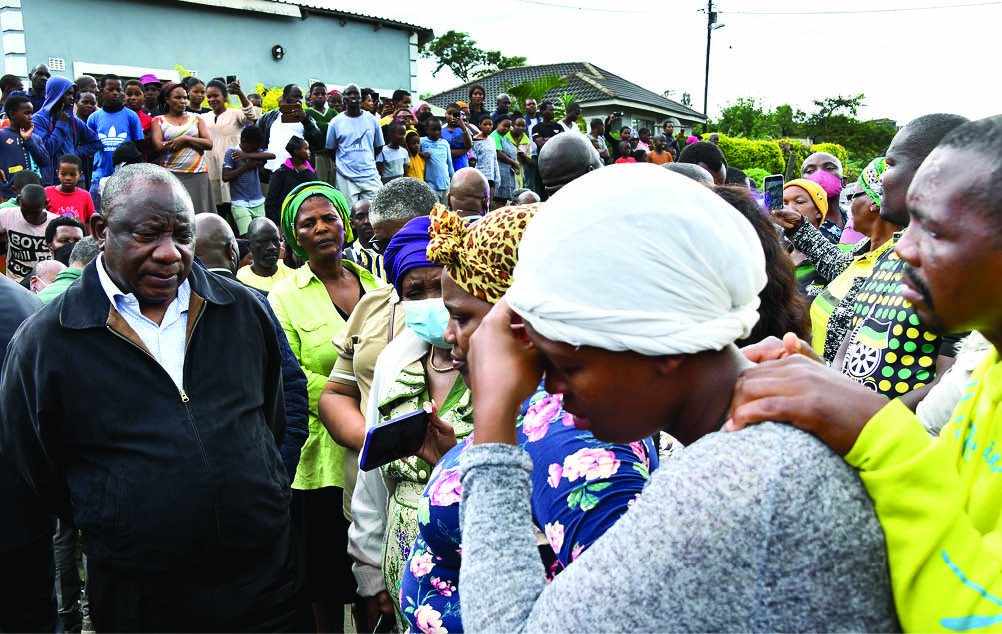
Government will also provide vouchers to help households rebuild partially damaged houses, the President said.
“A comprehensive assessment of the economic cost of these floods still has to be made, but it is clear that it will run into billions of rands for the rebuilding of infrastructure and loss of production.”
He added that the money set aside for the flood victims must reach those who need it the most.
“It will be critical, as we undertake this work, that all the resources we mobilise are used for their intended purposes and reach the intended recipients. There can be no room for corruption, mismanagement or fraud of any sort,” the President stressed.
Three-phased response
President Ramaphosa said government will respond to the disaster in three phases.
It will first focus on immediate humanitarian relief, ensuring that everyone affected is safe and their basic needs are met.
“Second, we will focus on stabilisation and recovery, rehousing people who have lost homes and restoring the provision of services. “Third, we will focus on reconstruction and rebuilding,” he said.
The reconstruction and building phase will include the construction of houses in suitable areas.
The Department of Human Settlements has already begun an assessment of damages to houses across the province.
“An immediate task is to house those people who have been displaced by the floods and preparations are underway to provide temporary residential units,” said President Ramaphosa.
The Department of Public Works and Infrastructure is identifying suitable state land that can be used for resettlement.
Extensive damage
The rains caused extensive damage to houses; businesses; roads and bridges; water, electricity, rail and telecommunications infrastructure. Schools, health facilities, police stations and magistrates’ courts were also affected, along with fuel and food supplies.
“It is estimated that over 270 000 learners were affected and over 600 schools were damaged, 16 of which cannot be accessed due to damage to connecting roads and bridges.
“Sixty-six public healthcare facilities were affected, although there has been minimal disruption to health services in most affected districts,” the President said.
Extensive work is underway to restore basic services to various areas in KZN.
More than 400 people have lost their lives in KZN and many people are missing. One death has also been reported in the Eastern Cape.
Over 4 000 homes have been destroyed and 8 300 have been partially damaged, leaving 40 000 people homeless.
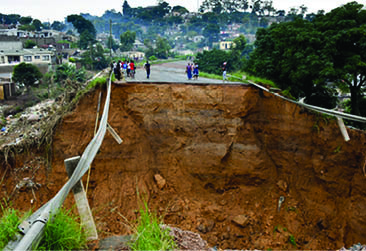 The President said that the South African Police Service (SAPS) and the South African National Defence Force (SANDF) have been leading search and rescue efforts.
The President said that the South African Police Service (SAPS) and the South African National Defence Force (SANDF) have been leading search and rescue efforts.
This includes the deployment of SAPS personnel, diving teams, canine units and various vessels, helicopters and fixed-wing planes to the most affected areas.
“Aircraft from the SANDF have been used both for rescue and for the delivery of relief supplies – such as food, water, tents and blankets – to people in inaccessible areas.
“I have authorised the SANDF to bring in more personnel, water storage and purification supplies and engineering teams to assist with electricity and water restoration,” he said Government departments at national and provincial levels; municipalities; non-governmental organisations and businesses have been distributing basic relief materials such as food, blankets, mattresses, clothing, chronic medication, toiletries and cooking utensils.
Cabinet recently declared a National State of Disaster in response to floods.
The President described the floods as a humanitarian disaster that called for a “massive and urgent relief effort.”
“The lives, health and well-being of thousands of people are still at risk. The floods have caused great economic and social damage,” he said.
The Port of Durban, which is vital to South Africa’s economy and is one of the largest and busiest shipping terminals on the continent, has been severely affected.
“The significance of the Port of Durban and related infrastructure for the effective operation of the country’s economy means that this disaster has implications far beyond KZN,” said the President.
Progress has already been made in restoring operations at the Port of Durban, opening alternative routes for trucks to access the port terminals and clean up debris in the harbour.
Free help to resolve financial complaints
Free help to resolve financial complaints LondekileIf you have a complaint against a financial services provider, such as a bank or an insurance company, and are battling to get it resolved, you can get free help from the Office of the Ombud for Financial Services Providers (FAIS Ombud).
The FAIS Ombud helps to resolve complaints between financial services providers and their customers.
The complaint must relate to a financial service. It will be considered if the financial services provider or someone who represents the company:
- Did not comply with a provision of the FAIS Act and you have or will suffer financially as a result.
- Wilfully or negligently rendered a service to you that has or will cause prejudice or damage.
- Treated you unfairly.
- Is not an authorised financial services provider such as a loan shark (mashonisa).

Types of complaints
The FAIS Ombud investigates various financial services complaints, including:
- Those relating to investments that are sold to people who cannot afford them.
- Providers recommending retrenchment cover to a person who is self-employed and does not qualify for the protection offered by the product.
- Replacing policies with others, saying they offer a better product when they don’t.
- Insurance policies that are sold as investments.
- Non-disclosure of important terms and conditions in policies, such as fees and commission payable, the maximum amount payable for a claim and waiting periods for cover.
An example of non-disclosure is when an insurance company does not inform you that you need to install a tracking device in your vehicle. If you don’t install the device, you will only be covered for fire and third party insurance, even though you are paying a premium for comprehensive vehicle insurance.
Submitting a complaint
Before submitting a complaint to the FAIS Ombud, you must try to resolve the issue with the provider. If you are not happy with the provider’s response, you have six months to submit the complaint to the FAIS Ombud.
When submitting a complaint to the FAIS Ombud, you must:
- Complete a complaints registration form. Download it from www.faisombud.co.za/how-to-complain or call 086 066 3274 to have it emailed or faxed to you.
- Complete, sign and submit the form by emailing it to info@faisombud.co.za or faxing it to 012 348 3447.
For more information about the FAIS Ombud or to lodge a complaint, visit www.faisombud.co.za, email info@faisombud.co.za or call 086 066 3274.
Haemophilia can be treated
Haemophilia can be treated LondekileCayden Solomons (5) was diagnosed with a hereditary blood clotting disorder – severe haemophilia A – shortly after birth.
When a person has haemophilia, their blood does not clot properly because it doesn't have enough blood-clotting proteins (factor VIII).
As a result, Cayden bleeds longer than other people. Bleeds can occur internally, in joints and muscles; or externally, from minor cuts, dental procedures or injuries.
“Cayden is very active and loves to explore. I always feel like I need to wrap him up in bubble wrap because I’m so afraid of him injuring himself,” says his mom Jamie Solomons.
Types of haemophilia
There are two main types of haemophilia.
“Haemophilia A is four times more common than haemophilia B. More than half of people with haemophilia A have the severe form,” says Professor Alan Davidson. He is the Head of the Blood and Cancer Service at Red Cross War Memorial Children’s Hospital, where Cayden is being treated.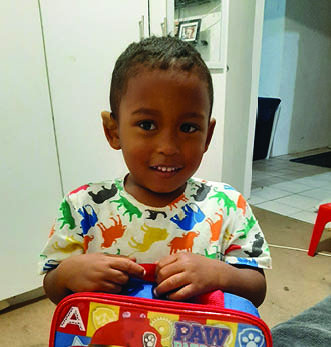
Haemophilia B disease happens due to a lack of clotting factor IX and occurs in around one in every 25 000 males worldwide, he adds.
Although no cure exists for haemophilia, doctors can successfully treat the condition. Treatment focuses on replacing the missing protein, preventing complications and giving or replacing the clotting factors that are too low or missing.
“Cayden’s treatment was hectic and emotional because he has difficult veins and had to be pricked more than once. Seeing my child cry in pain always breaks my heart, but I know it’s something he needs,” says Solomons.
Despite his condition, Cayden is a well-adjusted, clever and happy boy. “He knows a lot about his condition and is very vocal about it,” says his mom.
Signs to watch for
Solomons urges parents who suspect their children may have haemophilia to get treatment for them as soon as possible. “This is important to help reduce the risk of damage to joints, muscles and other body parts.”
Signs of haemophilia include:
- Unexplained and excessive bleeding from cuts, injuries, surgery and dental work.
- Many large or deep bruises.
- Unusual bleeding after vaccinations.
- Pain, swelling or tightness in the joints.
- Blood in the urine or stool.
- Nosebleeds without a known cause.
- Unexplained irritability in infants.
For more information about haemophilia or to get help, visit your closest healthcare facility.
Magigwana High School beats the odds
Magigwana High School beats the odds vuyelwanPrincipal Stanley Mpangana of Magigwana High School in Bushbuckridge, Mpumalanga, is running one of the country’s best schools, despite the many challenges faced by learners.
Magigwana was recognised as the best quintile 1 school nationally at the National Education Excellence Awards recently hosted by the Department of Basic Education. Quintile 1 represents the poorest schools in the country.
Themed ‘Celebrating excellence in districts and schools, and building back better with integrity’, the awards are based on education quality indicators (such as mathematics and science pass rates), rather than the overall National Senior Certificate (NSC) pass rate.
Magigwana obtained a 100% pass rate in mathematics, physical sciences and business studies, despite its large enrolment and disadvantaged learners. The school also secured a 100% NSC pass rate in 2020 and 96.2% in 2021.
“As a leader, it is important to get everyone to buy into your vision for the school. Resources and infrastructure will always be a challenge, but a motivated learner and teacher in a conducive environment will achieve great things, says Mpangana.
He adds that despite the COVID-19 pandemic, the school still performed well. 
“The Grade 12 learners were coming to school daily from 6am to 3:30pm and came for evening study from 6pm and 9pm. During weekends, we conducted some lessons for Grades 8 to 11; using a rotational system.”
Leading by example
Mpangana says he has always had a passion for teaching and instilling discipline in his learners.
“Since I started working as a teacher in 1991, I have had a passion for mathematics, physics and technology. My staff and I work hard and, as a team, have mutual respect and focus on the learners. We also lead by example; our words must match our work."
Honouring the teachers at the awards ceremony, Minister of Basic Education Angie Motshekga said they showed strength and resilience. “Let me assert my firm belief that we survived COVID-19 because we had men and women of integrity at the helm of our basic education system.”
Minister Motshekga encouraged the teachers not to lose focus. “Our purpose is to ensure that every child, regardless of their parents’ economic status, has sufficient stationery, nutritious food, books, a qualified teacher, decent sanitation, and the care they need in a secure school environment,” she said.
Opportunity for female agripreneurs
Opportunity for female agripreneurs vuyelwanThe Entrepreneurship Development Academy at the Gordon Institute of Business Science is partnering with Corteva Agriscience to upskill 30 female farmers.
Applications are now open for the 12-month programme, now in its second year. The programme which equips participants with the entrepreneurial, business and leadership skills they need to operate and sustain their farms profitably.
“Our goal is to ensure that these women succeed, by providing access to the tools they need to thrive,” says Betty Kiplagat, Head of Government Affairs and Industry Affairs at Corteva Agriscience Africa Middle East. 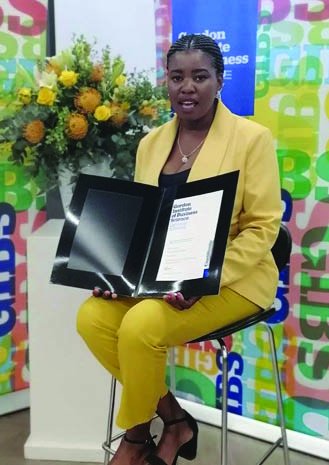
In the 2021 pilot programme, 33 of the 36 participants graduated. They were selected from 500 applicants.
Khethiwe Maseko (32), one of the graduates, is a self-taught farmer from Bronkhorstspruit in Gauteng. She owns Gugulam Poultry House, which sells live and slaughtered chickens. Maseko started her poultry business with 50 chickens, and now has over 300.
“It was a wonderful, amazing learning experience. The skills and tools learnt are invaluable," she says.
Maseko says female entrepreneurs need to stand up and do things for themselves.
"Always seek knowledge because once you have it, no one can take it away from you. Never undermine opportunities that come your way – grab them with both hands,” she adds.
How to apply
Applicants need to meet various criteria, including being a South Africa citizen aged 21 or over.
You must also have been in business for at least a year, in the agriculture or related sub-sectors, and must employ at least one person.
Your business’s annual revenue must be at least R200 000 (total sales) a year. Applications close on 31 May. While participants pay fee of R3 500, this is fully refundable upon graduation.
For more information visit www.research.net/r/CortevaII
Passion breeds business success
Passion breeds business success vuyelwanRendani Mutheiwana (29) is making headways in medical entrepreneurship after launching her orthotics and prosthetics business at the height of COVID-19, with the help of the National Youth Development Agency (NYDA).
Born and raised in Rathidili Village in the Vhembe District in Limpopo, Mutheiwana opened Rendani Mutheiwana Orthotics and Prosthetics in Makhado, after completing her internship and was unable to find a job.
After matriculating from Litshovhu Secondary School in 2009, she enrolled at the Vaal University of Technology and obtained a National Diploma in Sport Management in 2013.
It was in her final year that she became interested in medical orthotics (braces and splints) and prosthetics (external devices that replace body parts).
“I developed an interest in the Paralympics and wanted to work with people who are physically challenged or injured,” she says.
As a result, Mutheiwana registered at the Tshwane University of Technology and completed a National Diploma in Medical Orthotics and Prosthetics in 2019. 
Not being able to find a job after completing her internship in 2020 didn’t stop her from pursuing her dream.
“I registered my business in August 2020 and started working as the sole director, developing it according to my vision. I spent a lot of time researching how to open and successfully run a private healthcare practice,” she says.
During her studies, she often walked past the National Youth Development Agency (NYDA) office in Tshwane. “I researched what the NYDA does and knew I would be able to apply for funding for my business.”
Mutheiwana completed the NYDA’s short business management training course and then applied for funding. She received R50 000 and a website voucher with a 12-month maintenance contract.
“The grant funding took the business off the ground, providing basic tools, equipment and materials needed for my start-up; and the website plays a huge role in marketing,” she says.
Her inspiration came from her mother, also a successful entrepreneur.
Her mother opened a spaza shop in the late 1990s and started selling vegetables. In early 2000, she started growing morogo (African spinach) in her garden and selling her produce.
“I grew up seeing money coming in every day, and wanted a job that could do the same for me,” says Mutheiwana.
She urged aspiring entrepreneurs to find something that inspires them and make a living from their passion.
Her business, which now employs an administrative assistant, offers its clients treatment for orthopaedic disorders.
“We assess, measure and fit orthotic and prosthetic devices, and focus on restoring and improving physical mobility for those who are injured.
“I am working hard to grow the company and looking forward to creating more employment opportunities,” says Mutheiwana.
She stresses that it’s never too late to start something in life.
“Don’t be afraid to start something new, you can create a trail and open doors for others,” Mutheiwana adds.
For more information about Rendani Mutheiwana Orthotics and Prosthetics, visit http://rendaniorthotics.co.za.
Put an end to cyberbullying
Put an end to cyberbullying LondekileAs children and teens now have access to technology and the internet, bullying is no longer limited to face-to-face taunting in schoolyards or on street corners.
According to the South African Police Service (SAPS), cyberbullying occurs when a person uses the internet, email, text messages, instant messaging, social media, online forums, chat rooms or other digital technology to harass, threaten or humiliate another person.
The effects of cyberbullying can be devastating, leaving children feeling hurt, humiliated, angry, depressed and even suicidal.
Spot the signs
No matter how much pain it causes, children are often unwilling to tell adults that they are being cyberbullied.
Signs that a child is being cyberbullied include:
- Becoming sad, angry or distressed during or after using the internet or a cellphone.
- Appearing anxious when receiving a text or email, or have been on social media.
- Avoiding discussions or being secretive about computer or cellphone activities.
- Withdrawing from family, friends and activities they enjoyed.
- Refusing to go to school or specific classes, or avoiding group activities.
- Having mood, behaviour, sleep or appetite changes, or showing signs of depression or anxiety.
Tips for children
Children who are being cyberbullied should:
- Not respond. Your reaction is what the bully wants.
- Not retaliate. Responding with similar threats reinforces the bully’s behaviour.
- Save the evidence.
- Block the bully or leave the chat room.
- Report abusive comments to the social media website’s administrators.
- Talk to a friend or a trusted adult.
Tips for parents
Parents can help prevent their child from being cyberbullied by:
- Monitoring their technology use.
- Keeping the computer or other technology in a busy area of the house, rather than in the child’s bedroom.
- Setting up filters on technology.
- Using tracking software to block inappropriate content.
- Knowing your child's passwords.
- Encouraging children to talk to a trusted adult if they are targeted.
- Teaching children to not share their details and passwords online.
- Encouraging children to talk to you about their online life.
- Teaching children to not put anything online that they don’t want their classmates to see.
- Teaching children to not send messages when they are angry or upset.
If your child is a cyberbully
Parents who know their child is a cyberbully should:
- Educate the child about cyberbullying and how hurtful or damaging it is.
- Encourage the child to look at their actions from the victim’s perspective.
- Remind the child that cyberbullying can have serious legal consequences.
- Set technology limits.
- Make sure your child understands your technology rules and the punishment for breaking them.
Information courtesy of the SAPS.
If your child is being cyberbullied, you can contact your closest police station or call Crime Stop at 08600 10111 for help.
SANRAL suspends toll fee payment at uThongathi, Umvoti toll plazas
SANRAL suspends toll fee payment at uThongathi, Umvoti toll plazas LondekileThe South African National Roads Agency (SANRAL) has suspended the payment of toll fees at uThongathi Toll Plaza and Umvoti Toll Plaza on the N2 toll route in KwaZulu-Natal.
“This suspension will go a long way in assisting communities affected by the closure of alternative roads, which have been damaged by the floods,” Transport Minister, Fikile Mbalula, said.
The intervention follows representations from affected communities and a formal request by KwaZulu-Natal Provincial Government to suspend toll fees on major transport routes, including the N2 economic corridor and to lessen the financial strain on citizens.
KwaZulu-Natal was declared a national disaster by President Cyril Ramaphosa when the province experienced severe flooding which damaged roads and bridges recently.
This meant that motorists would have to pay toll fees they would not ordinarily have to pay if the alternative roads were operational.
Minister Mbalula said the department has been doing all it could to help those affected by floods.
“The damage to the roads in KwaZulu-Natal is extensive resulting in the closure of many roads to allow for clearing and rebuilding.
Amongst the interventions, I made a request to the Board of the South African National Roads Agency to consider intervention that include suspension of toll fees in seriously affected areas,” he explained.
Minister Mbalula said the repair of the alternative roads, will be prioritised to make it possible for the affected communities to use them again as soon as possible. – SAnews.gov.za
Social Relief Of Distress Grant for Disasters
Social Relief Of Distress Grant for Disasters vuyelwanWho can apply for Social Relief of Distress (SRD)?
This temporary provision of assistance is provided to people affected by a crisis or disaster and is mainly for people who are unable to meet their families most basic needs.
Which SRD is provided by SASSA during a crisis/disaster?
- SASSA provides food vouchers to the value of R1200 per family.
- R1980.00 x2 (total amount paid per family: R3,960.00) as food vouchers or cash to a family with deceased family member/s due to a disaster.
- School uniform is provided to learners who lost uniform during a disaster:
- Girls: R2,700.00
- Boys: R2,500.00
How do I apply for the food voucher?
Kindly submit contact details to ward councillor at your nearest municipality or to Social Worker.
How long do I receive it?
For only one month, because it expected that the people's lives will normalise and the other form of SRD including R350 will still be available for people who are experiencing hardship.
When do I receive the voucher?
Application is processed immediately after assessment is done and once approval is granted the voucher is issued.
Who to contact for more information:
SASSA Toll Free Number: 0800601011 or SASSA Regional Call Centre: 0338463400
facebook: SASSA News
Twitter: @OfficialSASSA
Steel entrepreneur shows her mettle
Steel entrepreneur shows her mettle LondekileRacheal Gaffane has always had an eye for opportunity. As a primary school pupil in Mamelodi, Tshwane, she sold sweets to her fellow schoolmates.
Today, Gaffane owns and runs Danchi Group, a steel manufacturing business that employs 13 people in Tshwane.
In 2017, Danchi approached the Gauteng Enterprise Propeller (GEP) to get assistance with starting her steel manufacturing business.
“The GEP helped my company with marketing material, a laptop and a printer,” she says.
The GEP is an organisation that falls under the Gauteng Department of Economic Development. It supports small medium micro enterprises and co-operatives across all sectors in Gauteng.
The GEP helps small businesses to register their business, and provides business advice and financial and non-financial support.
After receiving assistance from the GEP, Gaffane was able to establish relationships with industry steel giants such as Komatsu, Timken, Aveng Trident Steel and Kaefer, and grow her company.
Her company, manufactures steel components for the automotive and rail transport industries. The company also restores steel components for its clients.
Gaffane says what makes her business a success is her passion and appreciation for artisans in this sector.
“My father was an artisan, and I saw first-hand how underappreciated he was, even though his work was so pivotal. Today, my father is part of our team here at Danchi.”
Gaffane says the steel sector has had its own challenges, such as low sales and struggling to make a profit.
In 2020, Gaffane focused on growing her company and tapping into steel components manufacturing.
“The GEP came on board once more by providing funding for working capital. We invested the funding in equipment,” she says.
In December 2021, Danchi was the overall winner of the 2021 Eskom Business Investment Competition.
For more information about the GEP, call 087 057 200 or visit: www.gep.co.za
Success flows for water entrepreneur
Success flows for water entrepreneur LondekileRichards Bay entrepreneur Nakhokonke Mngadi (34) will always have a market for his product – life-giving water.
South Africa is a water-scarce country and Richards Bay is one of the areas that face potable water challenges. Mngadi’s business, Vawter Water, purifies water.
Mngadi says the idea to start this business came to him in 2016 when his city was faced with a water crisis.
In September 2016, the City of uMhlathuze issued a warning not to consume the tap water after high levels of manganese were detected in water samples. The water did not taste good and it contained a bad smell. It is there that I saw people needed a safe and reliable alternative."
Manganese is a greyish-white metal that is used in making steel and can be harmful to the body.
In 2018, Mngadi took part in the Sasol-I-Am-Preneur incubation programme after doing research about affordable drinking water to meet the region’s needs. The programme helped him focus his thoughts and gain the resources to start his business.
“The training helped with marketing and business and financial management skills,” he says.
Government support
Between 2018 and 2021, he successfully applied to the KwaZulu-Natal Department of Economic Development, Tourism and Environment Affairs’ Operation Vula Business Fund, which granted him R200 000 seed funding.
“I had to remain patient and persistent as the COVID-19 pandemic stalled the application process. While many of my peers were giving up and becoming despondent, I pushed on,” he says.
In 2021, he applied online for funding from the National Youth Development Agency (NYDA) and was granted R43 000, which he used to purchase a water softener and fridge, and brand his refilling station and bottles. Water softeners remove harmful minerals and some metals from water, to make it safe to drink.
Vawter Water now produces 250-litres an hour and Mngadi would like to increase this to more than 3000-litres a day, to meet the needs of his community.
To apply for seed funding through Operation Vula, visit 270 Jabu Ndlovu Street, Pietermaritzburg, go to www.operationvula.gov.za, email info@operationvula.gov.za or applications@operationvula.gov.za, or call 0800 333 667.
To apply for NYDA funding, visit the online portal at www.erp.nyda.gov.za, email info@nyda.gov.za or call 087 158 4742.
Too much salt is bad for you
Too much salt is bad for you LondekileWhile everyone needs to eat salt, eating too much of it can cause high blood pressure and increase the risk of heart disease.
Joy Williams, a dietician at Western Cape Clinic Symphony Way Community Day Centre, says salt (sodium) is addictive and some people crave it.
People can also crave salt due to a sodium imbalance, stress, lack of sleep, dehydration, excessive sweating or a medical condition, she adds.
Sodium is found naturally in a variety of foods, including milk and meat. It is also found in high amounts in processed food, such as bread; processed meat and sauces.
Decrease salt intake
According to the World Health Organisation, people should eat less than five grams (just under a teaspoon) of salt a day to reduce their risk of high blood pressure, cardiovascular disease, stroke and heart attack.
Williams says people can reduce their salt intake by:
- Cooking with less salt. Try to avoid using spices, soups and sauces when preparing food. Instead, use herbs, lemon, garlic, ginger, vinegar, onions and chilli to add flavour to your food. These contain less sodium and are healthier options.”
- Removing salt from the dinner table. Avoid adding salt to your meals at the dinner table. This is a bad habit and can be avoided if it is out of sight.”
- Eating less food that’s high in salt, such as processed meats and preserved or tinned food.
- Reading food labels. Salt is displayed as sodium on food labels. Opt for foods containing less than 120mg sodium per 100g, and avoid foods containing more than 600mg sodium per 100g.
Eat a balanced diet
Williams says a balanced diet, which contains all food groups – starch, protein, fat, fruit and vegetables – is important to maintain good physical and mental health.
Eating the correct portion of each food group is also essential, she adds.
You can portion your plate according to the ‘Plate Model’ in which:
- Half of your plate has non-starchy vegetables, such as broccoli, cabbage, tomatoes, cucumber or carrots.
- Quarter of your plate has high fibre starches, such as brown rice, whole-wheat pasta, sweet potato or butternut.
- Quarter of your plate has lean protein, such as grilled skinless chicken, fish, lean mince, ostrich meat or soya.
Information supplied by the Western Cape Department of Health.
Unite to keep children safe
Unite to keep children safe vuyelwanThe safety of South Africa’s children takes centre-stage during Child Protection Week, which runs from 29 May to 5 June.
Cynthia Nyoni, the Department of Social Development’s (DSD) Acting Director of Child Protection in the Children Services Directorate says the care and protection of children is everyone's responsibility.
Children who are exposed to sexual activity at too young an age, harmful cultural practices and South Africa’s high teen pregnancy rate are among the challenges tackled more during Child Protection Week.
“The abuse and neglect of children are evident in the increasing numbers of children falling pregnant,” says Nyoni.
She adds that a young girl may face medical, social and emotional problems as a result of her pregnancy, including interrupted education and poverty as a result of not being able to get a job. 
“A teen pregnancy may lead to a breakdown in the family structure, and this could affect generations to come.”
Nyoni says cases of violence against children and gender-based violence worsened during the COVID-19 hard lockdown and President Cyril Ramaphosa called it the country’s second pandemic.
“Research reveals that one in three women experience gender based-violence and one in five children under the age of 18 experience sexual abuse.”
During May, teenage pregnancy and child labour dialogues will be held to raise awareness and educate children, parents, caregivers and communities to protect children.
All State entities tasked with caring for children are expected to implement a year-long programme that ensures child protection is at the heart of everything they do, and that children have access to essential services,” she says.
Nyoni encourages parents and caregivers to have open relationships with their children. The DSD has programmes, such as Sinovuyo, which promote open communication and teach parenting skills,” she says.
Nyoni says community members must ask relevant questions when they suspect something is wrong and report concerns to the authorities such as the police and social workers.
Sexual consent
In South Africa, the age of consent to sex is 16, says Nyoni. There are some exceptions, however. She explains that if children engaging in sexual acts together are aged between 12 and 16, they will not be criminally charged, provided the age difference between them is two years or less.
“Children under the age of 12 years cannot legally consent to sexual intercourse, therefore it will always be rape, irrespective of the circumstances. Perpetrators will be prosecuted,” she says.
While the Constitution recognises that everyone has the right to give expression to their cultural and customary practices, these must be in line with the values of the Constitution, says Nyoni.
“Children should be protected from cultural practices that are harmful, such as early and forced marriages (ukuthwala), which is a form of abduction of young girls; virginity testing that is not regulated; and female genital mutilation ."
The Child Protection Week campaign will focus on children’s rights; educating families and communities about their responsibility towards the protection and care of children. It will also focus on reducing incidents of child abuse, neglect and exploitation through awareness programmes; and informing the public of children’s needs for healthy emotional, cognitive and physical development.
How to help
When you report suspicions of child abuse or neglect, explain why you suspect the child has been abused and share as much detail as possible, Nyoni says.
If a young mom is unable to care for her baby, she can contact the DSD to find out about temporary safe care and foster care options, which enable the parents to be reunited with her baby at a later stage, if possible.
Who to contact
- Childline (toll-free): 116
- Crime Stop: 08600 10 111 or, in an emergency: 10 111
- DSD hotline: 0800 220 250
- Gender-based Violence Command Centre: 0800 428 428, USSD ‘please call me’ facility *120*7867#, or SMS ‘help’ to 31531
Vets to service North West communities
Vets to service North West communities vuyelwanThe North West has gained nine new graduate veterinarians, who will be assisting communities in the prevention of disease, animal treatment and livestock production education while also gaining experience in the animal health sector.
“These new appointees are coming at an interesting time because the province has had its first outbreak of foot and mouth disease, which will give them exposure to disease control and management,” said the Department of Agriculture, Land Reform and Rural Development (DALRRD) Veterinary Services Director Dr Langa Madyibi.
He said the programme will offer a wide range of experience and challenges that will need the graduates to think strategically.
“They will also need to embrace working in villages and execute quality services with limited resources as they have to uphold the public service mandate at all times,” said Dr Madyibi.
Narissa Naicker (27), from Springs in Gauteng, has been placed with the Mothutlung State Vet and encourages young black females to study veterinary sciences as it is regarded as a predominately white industry. 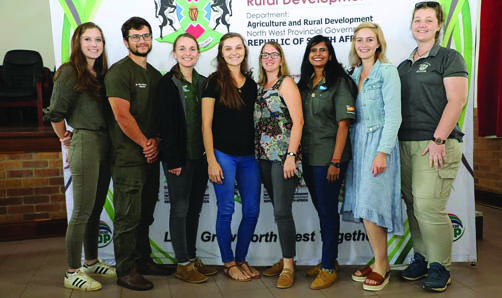
“There is ample opportunity to make a difference in our communities because we have been afforded the privilege that our parents previously didn’t have as black people in South Africa,” said Naicker.
Subjects needed at high school level to gain entry to the veterinarian course are mathematics and science (chemistry, physics or life sciences).
The University of Pretoria’s Faculty of Veterinary Science is the only institution in South Africa where people can study to become a veterinarian or veterinary nurse.
Veterinary students in their fifth year of study are contacted by DALRRD to be allocated to a facility within South Africa.
This is part of the process of being a qualified veterinarian which sees students vets being placed across the country for their 12 months of compulsory community service (CCS).
During this period, they offer services to rural communities, while gaining valuable experience and knowledge through the mentorship of seasoned vets from the department.
Each student vet is assigned a mentor or supervisor for the year and works directly under their guidance and supervision.
For more information on the application process of studying towards being a Veterinarian call the University of Pretoria on 012 420 3111.
e-Learning programme bridges the digital divide
e-Learning programme bridges the digital divide vuyelwanA partnership between the Mpumalanga Department of Education (DoE) and Telkom will help bridge the digital divide for learners and teachers in underprivileged communities.
Through the provincial e-learning programme, the Mpumalanga DoE will provide 6 700 teachers with laptops and 55 000 Grade 12 learners with tablets. The devices will be given to quintile 1, 2 and 3 schools in the province, which are situated in disadvantaged communities.
As the connectivity partner, Telkom will provide free monthly data.
“This programme is evidence of our commitment to equipping the Grade 12 class with the tools that will optimise their learning,” said Mpumalanga Premier Refilwe Mtshweni-Tsipane at the launch, which was held at Ubuhlebuzile Secondary School in Mkhondo Local Municipality.
“There is more to these technological tools that we are handing over today. They are the fruits that stem from the fourth industrial revolution that we are in and are catalysts of change,” she said.
In with the new
Ubuhlebuzile Secondary principal Nsizwa Hlatshwayo said the e-learning programme will give his students immediate access to past papers, study guides and a wider variety of study material. 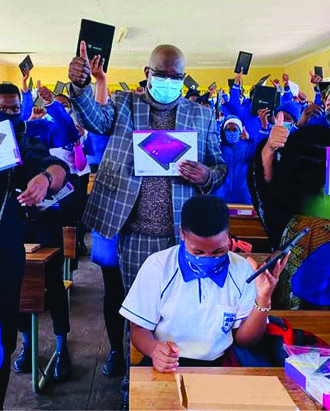
“We have spoken to the learners about keeping their tablets safe and well looked after,” he added.
Andile Thwala (17), student representative council leader and Grade 12 pupil, was the first to receive a tablet.
“These devices have had a great impact on how and when we study. Previously, we couldn’t study online and we also didn’t have access to other material. We now have it all, plus WhatsApp groups with the teachers so we can help each other – even after school hours.”
Thwala said his Grade 12 classmates are in high spirits after receiving the tablets.
“We know and understand that we have to be responsible but at the same time we are hopeful that this e-learning programme will improve their performance."
Mpumalanga MEC of Education Bonakele Majuba said the programme roll-out will be spread across various districts. “The quick delivery of devices will enable teachers and learners to utilise the devices to cover lost ground and to improve the teaching and learning process,” he said.
Telkom has also committed to upskilling 1 500 unemployed youth and training 10 000 teachers to enable them to train other educators on how to use digital tools for remote learning.
